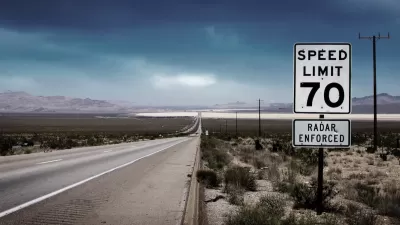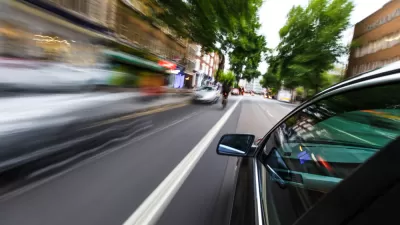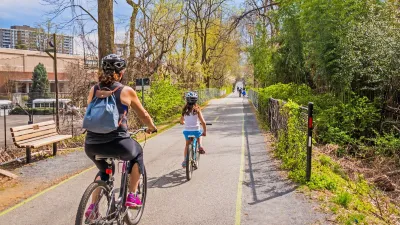Most personal vehicles can travel at speeds of over 100 miles per hour, far above any U.S. speed limit. Why?

Writing in Fast Company, David Zipper presents an argument for mandating speed-limiting technology on personal vehicles—an argument now being made by federal regulators.
Using an example from Las Vegas where a driver going more than three times the speed limit killed nine people, Zipper notes that an investigation summary from the National Transportation Safety Board (NTSB) of the crash “recommended that automakers install technology on all new cars that can prevent reckless speeding—and, for the first time, called on the National Highway Traffic Safety Administration to mandate it.”
For Zipper, “That is an excellent, overdue idea.” Speed governors are already mandated on much less deadly vehicles like e-scooters (and some company vehicles), and many modern cars do have speed limiters that cap speeds at 155 miles per hour. Why not set them at a more reasonable, less deadly limit?
The NTSB recommends that the National Highway Traffic Safety Administration (NHTSA) require the adoption of Intelligent Speed Assist (ISA) technology. As Zipper explains, “‘Passive’ ISAs issue audible or haptic alerts to drivers who exceed the top programmed speed, hopefully compelling them to slow down. ‘Active’ ISAs intervene in the car’s mechanics, often by requiring the driver to apply extra force on the accelerator.” The technology will be mandated on cars in Europe starting next year.
FULL STORY: You shouldn’t be driving over 100 mph—and your car shouldn’t let you

Maui's Vacation Rental Debate Turns Ugly
Verbal attacks, misinformation campaigns and fistfights plague a high-stakes debate to convert thousands of vacation rentals into long-term housing.

Planetizen Federal Action Tracker
A weekly monitor of how Trump’s orders and actions are impacting planners and planning in America.

San Francisco Suspends Traffic Calming Amidst Record Deaths
Citing “a challenging fiscal landscape,” the city will cease the program on the heels of 42 traffic deaths, including 24 pedestrians.

Defunct Pittsburgh Power Plant to Become Residential Tower
A decommissioned steam heat plant will be redeveloped into almost 100 affordable housing units.

Trump Prompts Restructuring of Transportation Research Board in “Unprecedented Overreach”
The TRB has eliminated more than half of its committees including those focused on climate, equity, and cities.

Amtrak Rolls Out New Orleans to Alabama “Mardi Gras” Train
The new service will operate morning and evening departures between Mobile and New Orleans.
Urban Design for Planners 1: Software Tools
This six-course series explores essential urban design concepts using open source software and equips planners with the tools they need to participate fully in the urban design process.
Planning for Universal Design
Learn the tools for implementing Universal Design in planning regulations.
Heyer Gruel & Associates PA
JM Goldson LLC
Custer County Colorado
City of Camden Redevelopment Agency
City of Astoria
Transportation Research & Education Center (TREC) at Portland State University
Jefferson Parish Government
Camden Redevelopment Agency
City of Claremont





























